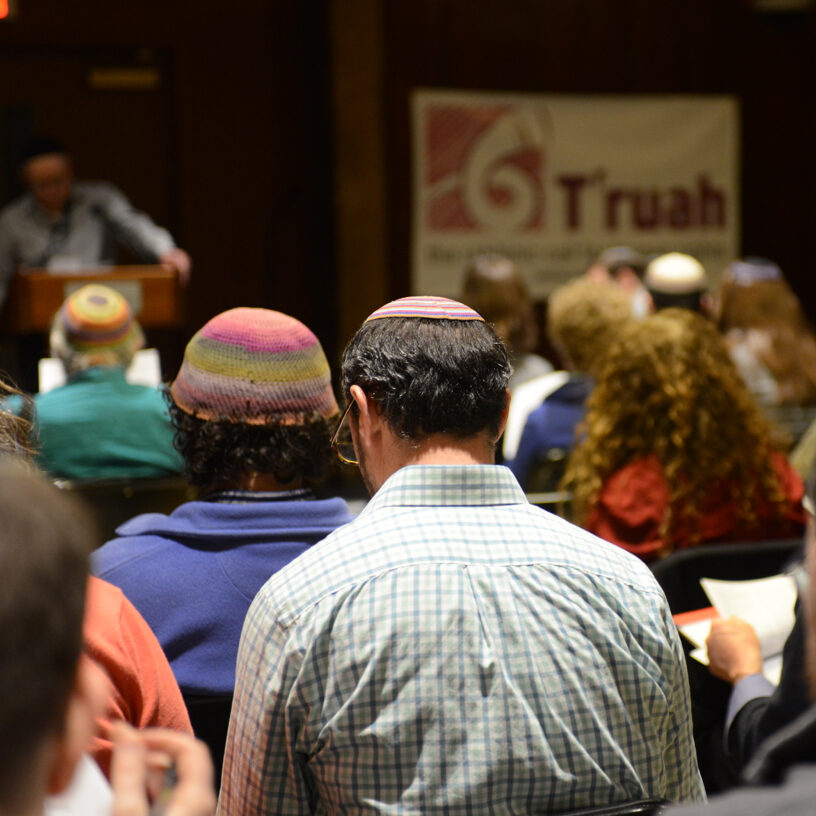>> Download or Purchase A Very Brief Guide to Antisemitism <<
With antisemitism on the rise in the United States and around the world — most recently evidenced by the man who took hostages in a synagogue in Texas because he believed in a conspiracy theory about Jewish power — it’s more important than ever to understand and recognize antisemitism. T’ruah’s “A Very Brief Guide to Antisemitism” offers historical background on antisemitism, as well as tools for addressing antisemitism within individual communities in a way that both keeps Jews safe and helps build a liberated world for everyone. Like all forms of oppression, fighting antisemitism must be part of our struggle for freedom and justice for all people.
As a communal leader, here are some ways you can multiply the impact of our new guide.
1. Share it with the community you lead.
Use the booklet as the basis for a sermon, newsletter column, or adult education series. You might connect it to Purim and Haman’s antisemitism; on Shabbat Zachor, what does it mean to both recall and blot out the memory of Amalek? On Pesach, the need for all people to be liberated provides a hook, as does the haggadah text “V’hi she’amda,” that in every generation someone arises to destroy the Jews. (True in your experience? Not true?) Other opportunities include Yom HaShoah, Tisha B’Av, and the parshiyot of the Joseph cycle. Teach it when feelings are not running high, so it is not new and unfamiliar when the next controversy arises.
2. Make it available in your building.
If you have a space that adults are visiting physically — a synagogue, a Hillel, a Hebrew school — and there’s a table or a rack with informational materials, add ours to the mix.
3. Share it with local faith leaders.
Do you have a warm relationship with the pastor or imam down the block? Is your synagogue in a formal or informal partnership with a neighboring church? Maybe you’re active in a local interfaith organization that is not explicitly about organizing but does care about justice? Antisemitism and Israel are topics we tend to shy away from discussing, because they can be scary, confusing, or just too complicated. Education can be a part of relationship-building or maintenance, before any conflict arises.
Share the booklet with a leader you trust. Check in a few weeks later, in a non-pressured way, to see if they have questions or want to talk. Tell them how much it means to you for them to take the time to read it. This could be a catalyst for deeper mutual understanding and relationship.
4. Share it with your local non-Jewish organizing partners.
Are you involved in a local chapter of IAF or Faith in Action? An organizing campaign on a specific local issue, like housing or refugee support? Share it using the same recommendations above.
5. Share it with your elected representatives.
It is important for elected officials to understand antisemitism so they can address it appropriately. If you have a relationship with an elected representative — a member of Congress, mayor, city councilmember, etc. — this is a great time to reach out to them, explain why antisemitism matters to you, and share a copy of the booklet. If you don’t already have that kind of relationship and would like to develop one, be in touch with us. We would love to help you strategize about how to develop it.
Whatever you do, we would love to hear about it and how it goes — especially if you plan to contact an elected representative. (T’ruah staff may be able to help with that.) Email Rabbi Lev Meirowitz Nelson with your story.

